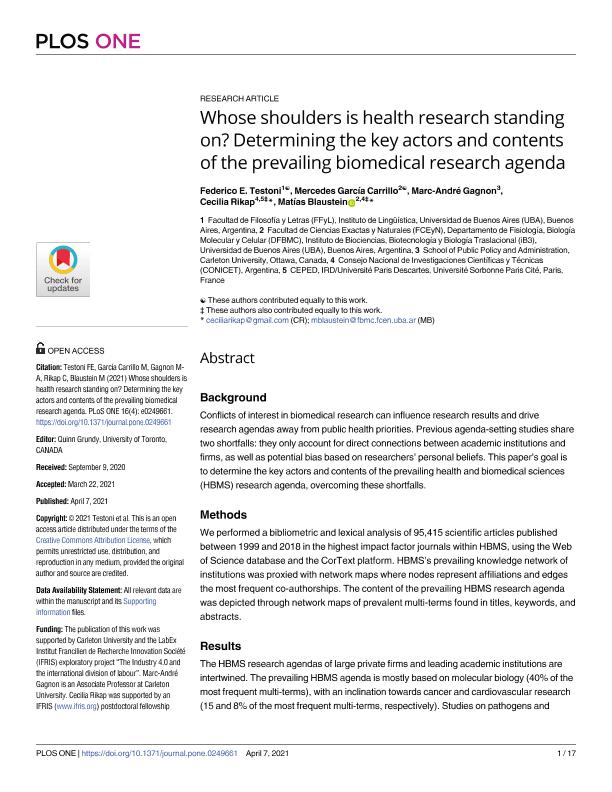Mostrar el registro sencillo del ítem
dc.contributor.author
Testoni, Federico E

dc.contributor.author
García Carrillo, Mercedes

dc.contributor.author
Gagnon, Marc André
dc.contributor.author
Rikap, Cecilia Alejandra

dc.contributor.author
Blaustein Kappelmacher, Matias

dc.date.available
2022-07-19T13:48:44Z
dc.date.issued
2021-04
dc.identifier.citation
Testoni, Federico E; García Carrillo, Mercedes; Gagnon, Marc André; Rikap, Cecilia Alejandra; Blaustein Kappelmacher, Matias; Whose shoulders is health research standing on? Determining the key actors and contents of the prevailing biomedical research agenda; Public Library of Science; Plos One; 16; 11; 4-2021; 1-17
dc.identifier.issn
1932-6203
dc.identifier.uri
http://hdl.handle.net/11336/162497
dc.description.abstract
Background: Conflicts of interest in biomedical research can influence research results and drive research agendas away from public health priorities. Previous agenda-setting studies share two shortfalls: they only account for direct connections between academic institutions and firms, as well as potential bias based on researchers’ personal beliefs. This paper’s goal is to determine the key actors and contents of the prevailing health and biomedical sciences (HBMS) research agenda, overcoming these shortfalls. Methods: We performed a bibliometric and lexical analysis of 95,415 scientific articles published between 1999 and 2018 in the highest impact factor journals within HBMS, using the Web of Science database and the CorText platform. HBMS’s prevailing knowledge network of institutions was proxied with network maps where nodes represent affiliations and edges the most frequent co-authorships. The content of the prevailing HBMS research agenda was depicted through network maps of prevalent multi-terms found in titles, keywords, and abstracts. Results: The HBMS research agendas of large private firms and leading academic institutions are intertwined. The prevailing HBMS agenda is mostly based on molecular biology (40% of the most frequent multi-terms), with an inclination towards cancer and cardiovascular research (15 and 8% of the most frequent multi-terms, respectively). Studies on pathogens and biological vectors related to recent epidemics are marginal (1% of the most frequent multi-terms). Content of the prevailing HBMS research agenda prioritizes research on pharmacological intervention over research on socio-environmental factors influencing disease onset or progression and overlooks, among others, the study of infectious diseases. Conclusions: Pharmaceutical corporations contribute to set HBMS’s prevailing research agenda, which is mainly focused on a few diseases and research topics. A more balanced research agenda, together with epistemological approaches that consider socio-environmental factors associated with disease spreading, could contribute to being better prepared to prevent and treat more diverse pathologies and to improve overall health outcomes.
dc.format
application/pdf
dc.language.iso
eng
dc.publisher
Public Library of Science

dc.rights
info:eu-repo/semantics/openAccess
dc.rights.uri
https://creativecommons.org/licenses/by/2.5/ar/
dc.subject
BIOMEDICINE AND HEALTH
dc.subject
CANCER
dc.subject
PHARMACEUTICAL CORPORATIONS
dc.subject.classification
Ciencias Biomédicas Sociales

dc.subject.classification
Ciencias de la Salud

dc.subject.classification
CIENCIAS MÉDICAS Y DE LA SALUD

dc.subject.classification
Ciencias Sociales Interdisciplinarias

dc.subject.classification
Otras Ciencias Sociales

dc.subject.classification
CIENCIAS SOCIALES

dc.subject.classification
Filosofía, Historia y Filosofía de la Ciencia y la Tecnología

dc.subject.classification
Filosofía, Ética y Religión

dc.subject.classification
HUMANIDADES

dc.title
Whose shoulders is health research standing on? Determining the key actors and contents of the prevailing biomedical research agenda
dc.type
info:eu-repo/semantics/article
dc.type
info:ar-repo/semantics/artículo
dc.type
info:eu-repo/semantics/publishedVersion
dc.date.updated
2022-07-15T14:54:06Z
dc.journal.volume
16
dc.journal.number
11
dc.journal.pagination
1-17
dc.journal.pais
Estados Unidos

dc.journal.ciudad
San Francisco
dc.description.fil
Fil: Testoni, Federico E. Universidad de Buenos Aires. Facultad de Filosofía y Letras; Argentina
dc.description.fil
Fil: García Carrillo, Mercedes. Consejo Nacional de Investigaciones Científicas y Técnicas. Oficina de Coordinación Administrativa Ciudad Universitaria; Argentina. Universidad de Buenos Aires. Facultad de Ciencias Exactas y Naturales. Instituto de Biociencias, Biotecnología y Biología Traslacional; Argentina
dc.description.fil
Fil: Gagnon, Marc André. Carleton University; Canadá
dc.description.fil
Fil: Rikap, Cecilia Alejandra. Consejo Nacional de Investigaciones Científicas y Técnicas; Argentina. Universidad de Buenos Aires. Facultad de Ciencias Económicas. Instituto de Investigaciones Económicas; Argentina. Institut Francilien Recherche Innovation Societe. Centre Population Et Developpement; Francia
dc.description.fil
Fil: Blaustein Kappelmacher, Matias. Consejo Nacional de Investigaciones Científicas y Técnicas. Oficina de Coordinación Administrativa Ciudad Universitaria; Argentina. Universidad de Buenos Aires. Facultad de Ciencias Exactas y Naturales. Instituto de Biociencias, Biotecnología y Biología Traslacional.; Argentina
dc.journal.title
Plos One

dc.relation.alternativeid
info:eu-repo/semantics/altIdentifier/url/https://journals.plos.org/plosone/article?id=10.1371/journal.pone.0249661
dc.relation.alternativeid
info:eu-repo/semantics/altIdentifier/doi/https://doi.org/10.1371/journal.pone.0249661
Archivos asociados
